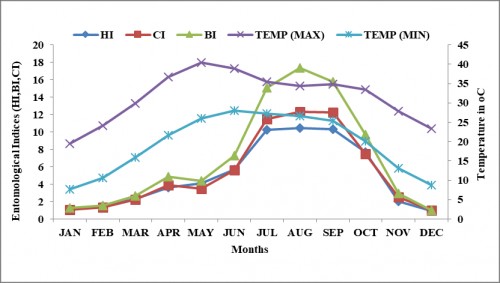Influence of environmental factors on dengue fever in Delhi
Author(s): Babita Bisht, Roop Kumari, BN Nagpal, Himmat Singh, Sanjeev Kumar Gupta, AK Bansal and NR Tuli
Abstract: Dengue is a major public health challenge with population density, inadequate water supply, improper solid waste management, climate change and poor socio-economic status are identified key determinants for Dengue /Severe Dengue. Environmental conditions such as temperature, humidity and precipitation etc. also play a vital role in the incidence of Dengue. The present study was carried out with aim to find correlations between incidence of dengue fever and environmental factors from 2011 to 2016 in Delhi.
No linear correlation was observed between rainfall and dengue cases, however the peaks of rain fall and the dengue cases had some lag period difference of about two months. When this lag period is adjusted the high positive correlation (r=0.9868) was seen that both peaks perfectly matched which suggest the cases are related to rainfalls in spite of indoor breeding of mosquitoes. High correlation was observed between average rain fall with average cases (97%; r= 0.986)
The study shows a clear dependency of dengue cases with climatic factors and further revealed that there is a lag phase between rains and appearance of cases which provides an opportunity to programme managers to carry out vector control measures along with source reduction. This window of opportunity provides enough time to mobilize resources for the implementation of interventional measures to lower the impact of the epidemic.
 Fig.:
Fig.: Monthly association of entomological indices with Temperature
How to cite this article:
Babita Bisht, Roop Kumari, BN Nagpal, Himmat Singh, Sanjeev Kumar Gupta, AK Bansal, NR Tuli. Influence of environmental factors on dengue fever in Delhi. Int J Mosq Res 2019;6(2):11-18.



